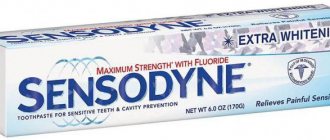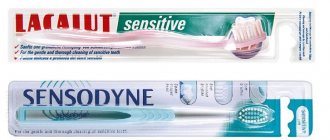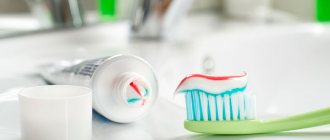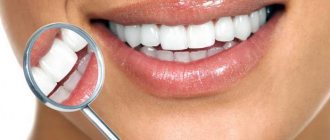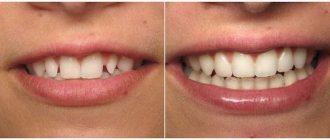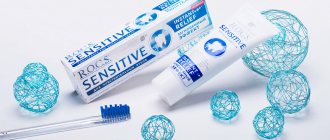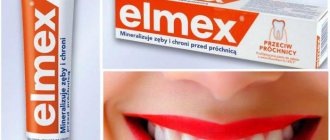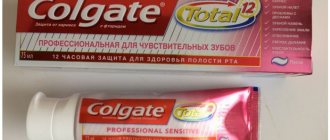- Treatment at the dentist's office
- The principle of operation of toothpastes for sensitive teeth
- Active substances in pastes
- Which desensitization paste to choose for a child?
- Examples of pastes for daily use
Increased sensitivity of teeth, medically known as hyperesthesia, is a disease that is familiar to every second adult.
The main manifestation is a painful reaction to hot or cold, sour or sweet foods, chewing, or brushing teeth. Enamel is the hardest tissue in the body, but even it is vulnerable to acidic and aggressive mechanical influences. In areas where the enamel becomes thinner, substances from outside enter the dentin, or more precisely, into the dentinal tubules. They contain many nerve endings that react to the stimulus.
Increased sensitivity of teeth is not a disease in the usual sense, but a symptom that can be caused by various reasons.
- Recent systemic
illnesses. - Dental
diseases. - Deficiency
of vital vitamins and microelements in the body due to an unbalanced diet. - Using toothbrushes with hard bristles
and abrasive toothpastes. - Habit of biting nails
or clenching teeth. - Poor
oral hygiene. - Recent in-office whitening
.
Depending on the cause, the way to deal with hypersensitivity will be different. How to reduce tooth sensitivity or prevent it - we tell you in this article.
Treatment at the dentist's office
To determine the clinical situation and causes of sensitivity, we recommend that you consult a dentist. The doctor will be able to prescribe procedures that are effective for your case.
- Fluoridation and remotherapy
- they strengthen the enamel, saturate the hard tissues of the tooth with useful elements and help reduce sensitivity. - Electrophoresis
- it improves the susceptibility of hard tissues to beneficial substances of fluorinated and remineralizing compounds. - Treatment of caries and filling
.
To maintain the effect of the procedures, the dentist may recommend enamel-strengthening products for home use - daily pastes, gels and rinses.
Question No. 2. Are toothpastes that contain antiseptics safe?
Not if you use such pastes constantly. As a rule, pastes containing antiseptics (triclosan, chlorhexidine, hexitidine) are prescribed for inflammatory gum diseases. You should brush your teeth with such pastes for no more than two weeks in a row. With their frequent use, antiseptics, designed to destroy only harmful bacteria, can smoothly switch to useful ones: a certain balance between microorganisms is disturbed, resulting in painful processes.
Toothpastes containing antiseptics as the main components, for example, Lacalut Aktiv, PresiDENT Active, SPLAT Professional ACTIVE, Elmex Aronal, Blend-a-med Pro-Expert Gum Protection, are considered harmless, but for their correct use, consultation with your doctor is necessary.
Active substances in pastes
To quickly relieve pain, use toothpastes and gels with potassium
, which penetrates the dentinal tubules and anesthetizes the nerve.
And to strengthen the enamel and seal the dentinal tubules, you will need products containing fluoride
,
calcium
or
hydroxyapatite
.
Pastes with fluoride
Fluoride plays an important role for the body and, in particular, teeth.
- Makes bones strong and hard.
- Supports immunity.
- Prevents caries from developing.
The effectiveness of fluoride in preventing caries has been proven by many studies. Choose toothpastes with a fluoride concentration of at least 1000 ppm (preventative pastes) and from 1350 to 1500 ppm (medicinal pastes). The most popular fluoride-containing products are “Ftorlak”, “Fluocal”, “Diplen Denta F” films and Keystone gels. You can learn more about the benefits of fluoride in our article.
Pastes with calcium
An alternative strengthening element to fluoride is calcium. It provides teeth with strength and hardness. Some of the most effective products with it are dental gels GC Tooth Mousse, GC MI Paste Plus and gel for sensitive teeth ROCS Medical Sensitive.
Tooth gel GC Tooth Mousse Strawberry
Tooth gel GC MI Paste Plus Multifruit
Gel for sensitive teeth ROCS (ROCS) Medical Sensitive
Pastes with hydroxyapatite
Hydroxyapatite is a mineral that is the basis of bones and teeth (96% of enamel consists of it). It looks like a white powder. In dentistry, hydroxyapatite is included in dental products as an element that remineralizes and strengthens enamel.
Hydroxyapatite provides:
- decreased enamel sensitivity;
- replenishment of mineral deficiency;
- prevention of caries and its treatment at the white spot stage.
The absolute safety of hydroxyapatate is its main advantage.
The substance can be used in hygiene products even for children and pregnant women. ApaCare Repair restoring dental gel, Biorepair sensitivity reliever, Innova and Biorepair rinses and pastes will help solve the problem of sensitivity.
ApaCare Repair Restoring tooth gel
Biorepair drug for reducing sensitivity and restoring enamel
Suspension Splat Innova Liquid Enamel
INNOVA Intensive strengthening of hypersensitive teeth
Biorepair Mouthwash 500 ml
Toothpaste Biorepair Denti Sensibili PLUS
Material and methods
In a study conducted at the Department of Clinical Dentistry of Moscow State Medical University named after. A.I. Evdokimov, 40 patients (17 men and 23 women) aged from 18 to 35 years took part, who were diagnosed with hyperesthesia of the hard tissues of the incisors, canines and premolars - at least 20 permanent teeth. All patients underwent a clinical examination and determination of objective indicators - the OHI-S hygienic index (J. Green, J. Vermillion, 1964), thermometry.
To determine the intensity of pain, we used a visual analogue scale (VAS)—a 10-cm segment, where 0 is “no pain” and 10 is “unbearable pain.” The segment is divided into parts that correspond to the evaluation criteria: 1-3 corresponds to a “mild” pain reaction, 4-6 to a “moderate”, 7-10 to a “strong” pain reaction. The subject recorded a mark on the segment corresponding to the pain reaction at the time of the study.
To objectively assess the degree of hyperesthesia of hard dental tissues, the Dental Hyperesthesia Intensity Index (DHI) was used. The calculation was made in points: 0 points - no pain reaction to stimuli, 1 point - pain reaction to temperature stimuli, 2 points - pain reaction to temperature and chemical stimuli, 3 points - pain reaction to all types of stimuli.
The level of dental hyperesthesia was determined by the method of a direct air jet of compressed air, carried out with a standard blower, aimed perpendicular to the surface under study at a distance of about 1 cm (temperature stimulus) - the so-called Schiff index: 0 points - the subject does not respond to the air stimulus; 1 point - the subject reacts to the air stimulus; 2 points - the subject reacts to the air stimulus, insists on stopping the stimulus; 3 points - the subject reacts to the air stimulus and insists on immediate cessation of the stimulus. The results of the study were processed statistically with the calculation of the average standard error p
.
Patients were advised to use only Sensodyne Instant Effect toothpaste without changing their usual lifestyle. Research controls were carried out before the start of the study, after a single use of toothpaste, after 7 and 14 days and after 1 month of use.
Which desensitization paste to choose for a child?
The delicate enamel of baby teeth requires special delicate care. Children's toothpaste should not contain SLS, parabens, or titanium dioxide. If the paste foams a lot, it means that it contains SLS, and it is better to discard it.
It is important that the amount of abrasives is minimal (RDA - from 0 to 20).
Children's toothpaste should contain a small amount of fluoride: up to 4 years - 200 ppm, from 4 to 8 years - 500 ppm.
It is very important that the paste is not only effective and safe, but also tasty. This will help your baby learn to brush their teeth regularly.
Sensodyne /
Sensodyne paste was recommended by dentists (yes, several at once), however, with one voice in this format: - Buy a Rembrandt! - Expensive! “Then take Sensodyne.” - Oh, that's better. - But keep in mind that it is now being actively counterfeited, so you need to buy it in trusted pharmacies, preferably those where you have reliable friends. Something like this, yes.
I started my “campaign on toothpastes” (not counting the ancient Soviet Fluorodent, standard for every family) after Perestroika, like everyone else, with Colgate, and eventually went to Blend-a-med, because, whatever one may say, it was at that time the best generally known. But at the next preventive appointment with the dentist many, many years ago, which again smoothly flowed into dental treatment, the doctor directly and openly confronted him with a fact: we need to take more serious care of our teeth, and mass-market toothpastes are toys. He spoke then, however, about pastas not so delicately.
Since then I have only used Sensodyne “Gentle Whitening”. "Sensodyne", by the way, seems to be incorrect. And, be that as it may, I never had my teeth treated again. Separately, it should be noted that Sensodyne perfectly treats my sensitive enamel, and not only relieves pain, but also somehow heals it - before the next food that actively thins the enamel. Plus a whitening effect after cleaning your face: no, don’t expect the level of whitening of an expensive procedure in dentistry (or even high-quality home whitening with a tray), but the fact that your teeth become whiter is noticeable to the naked eye.
The paste will not save you from age-related plaque along the edges of your teeth (even if you brush your teeth correctly, do not smoke or drink coffee). But dentists say that no paste will protect you from this, and no thorough brushing of your teeth, unless expensive toothpastes may delay the onset of the problem. The taste of Sensodyne may seem a little harsh to some. Foams well and very well. The tube lasts for a month or so.
I tried both remaining options of Sensodyne brand pastes, and, however, I don’t remember which of them had what problem, and what shortcomings apply to both, but in the end I didn’t like both at all: one had a brutally sharp taste; She, in my opinion (any of them, anyway), foamed very poorly, and each time while brushing her teeth I had to take an additional portion of paste; In my opinion, both at once did not help at all to cope with tooth sensitivity; Well, I immediately forgot about the usual level of whiteness of my teeth with them, although I have been brushing my teeth correctly for a long time - taught by a doctor - and so thoroughly that my friends are always amazed during trips together. So “Gentle Whitening” in all respects turned out to be the best of its analogues, although whitening pastes usually have reduced other effects.
Examples of pastes for daily use
There are many toothpastes that can solve the problem of sensitivity. When choosing, you should pay attention to the following parameters.
- Active ingredient (fluorine, calcium, hydroxyapatite, potassium);
- its concentration;
- additives and impurities.
The best way to avoid oral diseases remains regular prevention. Below are examples of pastes for daily use and their main active ingredients, which have proven to be the most effective in combating sensitivity.
| Paste | Active substance |
| Theodent | theobromine (stimulates the formation of its own hydroxyapatite crystals), calcium |
| Apadent Sensitive | hydroxyapatite, calcium, potassium |
| Apagard Premium | hydroxyapatite, calcium |
| Biorepair paste line | hydroxyapatite |
| Miradent Mirasensitive hap+ | hydroxyapatite, fluorine, potassium |
| Remars Gel | calcium nitrate + ammonium hydrogen phosphate - a brushite crystal is formed, similar in composition to a hydroxyapatite crystal |
| Dentissimo For pregnant women and young mothers | calcium and hydroxyapatite |
| Innova range of pastes | hydroxyapatite |
| Splat Special Dream | hydroxyapatite |
| Elgidium Sensitive | fluorine |
| Iney Magic | hydroxyapatite, fluorine |
Daily oral hygiene using strengthening pastes is the best prevention of tooth enamel sensitivity at home.
How to choose the right toothpaste
When choosing good toothpastes, it is important to find a product that best suits you according to other criteria. To do this, it is necessary to take into account a number of nuances:
- Purpose – for what purpose are you buying the paste, what task should it perform? Perhaps you have problems with the condition of your oral cavity that require correction.
- Composition – for a particular person, the best paste is made by the components it contains. By paying attention to the composition, you can identify the key components for yourself that must be present or absent in the required paste.
To make it easier for you to choose the best whitening toothpastes for yourself, let’s look at the mentioned nuances in more detail.
People's opinions about Sensodyne Total Care teeth and gum care product
Sensodyne Restoration and Protection toothpaste has mostly positive reviews. People like the product from this series. Indeed, the effect is obvious: plaque disappears after the first cleaning, gums become stronger after 2 weeks of regular use.
However, there are still people who did not like this product. Some users did not like this paste because it stings the tongue and lips. Although the reviews from the same people about other types of Sensodyne are positive. And some even note that after using this paste, wounds appeared on the inside of their lips and on their tongue, and it even became painful for women and men to speak. It turns out that there was an allergic reaction to this paste. This can really happen, and the manufacturer does not deny this fact. Therefore, when choosing Sensodyne Total Care, you need to be extremely careful and if you experience any unpleasant sensations, it is better to stop using it.
User feedback about Sensodyne Pronamel paste
People leave only positive reviews about this product. They like the effect of this paste: indeed, it is able to cope with the aggressive effects of citrus acids on enamel. Those men and women who have tried this remedy on themselves claim that they have stopped forming root stones.
The paste really brings the effect that is expected from it. People also like that this dental care product doesn't have a cloying bitterness, isn't abrasive, and doesn't leave an aftertaste. In addition, Sensodyne, a toothpaste whose reviews are on numerous forums, perfectly refreshes the oral cavity and removes unpleasant odors. Even after eating savory foods like onions and garlic, the aroma does not remain. People like that they can use this toothpaste every day. Manufacturers also took care of children by releasing a special product for them.
Sensodyne with fluoride
The well-known Sensodyne toothpaste with fluoride is, so to speak, a time-tested product that has been on the market for many years. Its action is based on two main compounds: sodium fluoride and potassium nitrate.
As noted above, sodium fluoride promotes the formation of fluorapatite on the surface of tooth enamel, and also, importantly, inside the dentinal tubules, favoring their clogging. And potassium ions, concentrating at the nerve endings inside the tubules, reduce their susceptibility to irritation.
This tandem of two substances provides Sensodyne toothpaste with fluoride (Sensodyne F) with a well-pronounced effect in reducing tooth sensitivity.
Composition of Sensodyne paste with fluoride:
The effectiveness of the product is confirmed by relevant tests, as well as reviews from ordinary people. Although it should be noted that the composition of the paste is inferior to the above-described Sensodyne Maximum Protection, the formulation of which is more “advanced”.
Contraindications to the use of Sensodyne with fluoride are individual intolerance to the components of the product and age under 12 years.
Review
“We have been using Sensodyne toothpaste with fluoride for the whole family for 6 years now. I like that over the years not a single new hole has appeared in my teeth and the taste is pleasant. My daughter’s permanent teeth don’t even have a hint of caries, this is the best indicator for me. Although I heard that Sensodin is not suitable for everyone, I still think that the paste is worthy.”
Larisa, Moscow
Quick results
Sensodyne Instant Effect toothpaste eliminates microbes that cause caries. Also, this personal hygiene item instantly covers dentin with a special protective layer. The product from the Rapid Action series heals wounds on the gums, helps to cope with plaque, and also returns whiteness and shine to teeth. The paste has a mild taste, so it can be used every day.
This dental care product is also prescribed by dentists in cases where there is an urgent need to localize pain. And to achieve this, you should squeeze out a little paste and rub it into the painful area. Just 1 minute of exposure is enough to reduce pain. After this procedure, you can safely eat food to which your teeth previously reacted painfully.
The manufacturer of the product recommends cleaning no more than 2 times a day. After this hygiene procedure, you should rinse your mouth thoroughly.
User feedback about Sensodyne Instant Effect paste
People's reviews of Sensodyne Rapid Action dental care product are mostly positive. Many people are happy about this unexpected effect. According to them, the paste can reduce tooth sensitivity already on the second day of use. Some people previously doubted and did not think that such an advertised remedy would actually have such an effect. But, as it turned out, the producers did not deceive and wrote it exactly as it is. Sensodyne Rapid Action toothpaste helps people get rid of sensitive teeth and gums, and also perfectly cleanses them. Among the disadvantages, users note the high consumption of the product, since it does not foam, as well as the high price compared to other oral care products.
Price
Sensodyne toothpaste is sold both in pharmacies and in specialized household chemical stores. The price of this oral care product depends on several factors: the type of paste, the location of the establishment where it is sold, as well as the store’s markup. Thus, the price of the drug can range from 140 to 290 rubles. Sensodyne toothpaste for sensitive teeth, reviews of which say that it is truly excellent, is one of the most expensive. Its price in various pharmacies ranges from 290 rubles. And the cheapest type of this product is Sensodyne Complex Protection paste. You can purchase this drug for 140 rubles.
Now you know what Sensodyne toothpaste is, what types it comes in, and how it affects the oral cavity. We found out what people think about this product and realized that it is actually one of the best products for caring for teeth and gums. And depending on what problems a person has with the oral cavity, the appropriate Sensodyne paste is selected.
